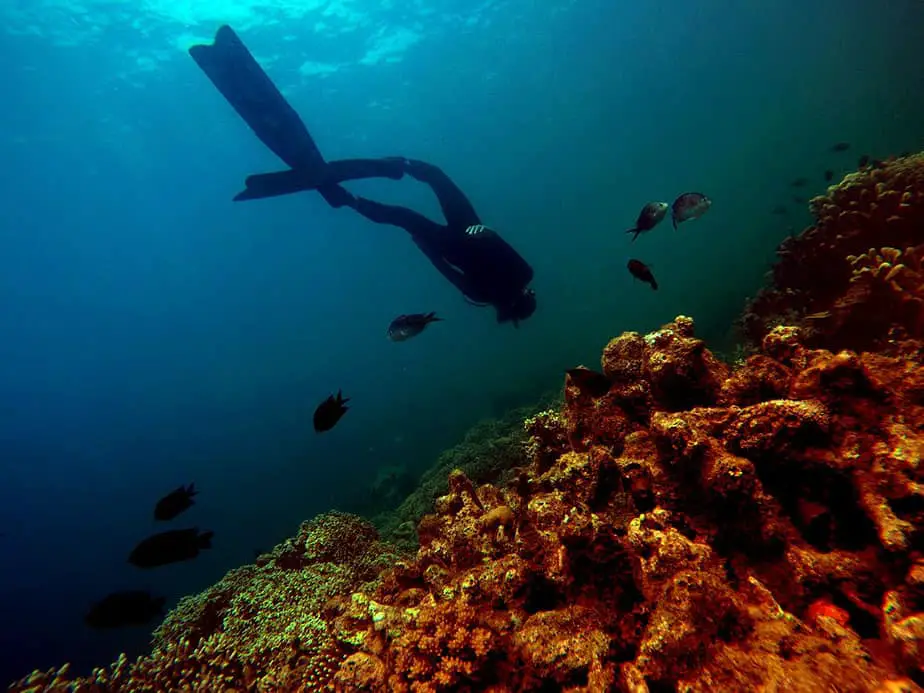Both freediving and scuba diving share the same ideal of humans pushing past their limits to conquer the depths whether it is through physical training or ingenuity. These disciplines allow the divers to explore the underwater world in ways our ancestors never thought possible. There is a friendly rivalry between students of each sport, with each claiming their sport is better than the other.
Truthfully, there are pros and cons for both freediving and scuba diving. Also, comparing the two is like comparing apples and oranges because they are vastly different disciplines. Other than the water and diving aspects, the two couldn’t be more different. In this article, we’ll examine the similarities and differences between freediving vs. scuba diving to help you decide which is the right pick for you.
What is freediving?
Freediving is the act of diving underwater for as long or as deep as possible and surfacing within a single breath. The goal of freediving is different from scuba diving because it is about challenging oneself and pushing past one’s physical limits. They keep track of and try to surpass their personal breath-hold or depth record, and if one is competitive enough, the world record.
Of course, you can also freedive recreationally and try to explore the underwater world one breath at a time, also known as skin diving, however it’s not as efficient as scuba diving. Snorkelers who also diver down to see the marine life up close should consider taking some freediving courses to improve their breath-holding capabilities.
What is scuba diving?
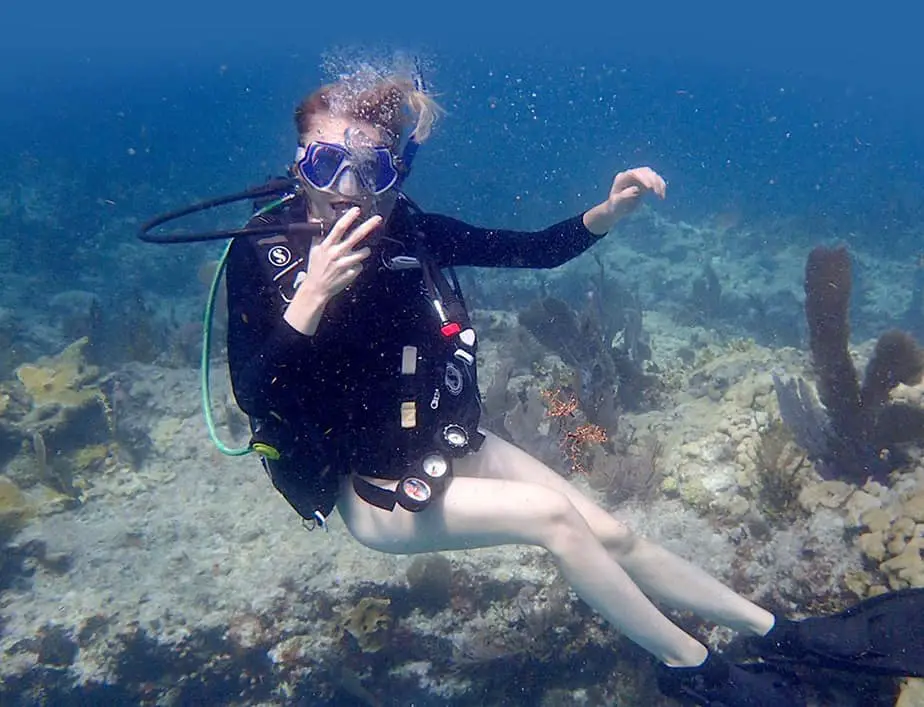
Scuba diving is the act of diving with SCUBA equipment, which stands for “self-contained underwater breathing apparatus.” Essentially, it is when one dives with a source of oxygen, such as a scuba cylinder, and to allow for breathing underwater. This allows for extended bottom times and depth limits beyond what a human can achieve in a single breath.
The most popular ways to explore and observe the underwater environment are scuba diving, snorkeling, and freediving to some extent. As we mentioned already, freediving is not the most efficient way of doing so. Scuba diving is the best way to observe the aquatic life and environment at a leisurely pace thanks to the ample time that a scuba cylinder provides.
Breathing differences
One of the first things a scuba diver is taught is to never hold their breath underwater. Holding one’s breath underwater while going from a high pressure area to a lower pressure area, such as while ascending, will cause the air in the lungs to expand, potentially causing a ruptured lung if the airways are not opened. Yet, freedivers hold their breath throughout their entire dive with no lung overexpansion issues. How?
Since a freediver holds their breath the entire time, even as their lungs and the air inside compresses as they dive due to the water pressure, and subsequently expands on the ascent, the volume of air in the lungs never exceeds the lungs’ capacity to hold it since no additional air was inhaled during the dive. Thus, this dangerous phenomenon that can occur to a scuba diver will never occur to a freediver.
Additionally, since freedivers absorb little nitrogen underwater (they are not breathing in compressed air and so there is no extra nitrogen to absorb), freedivers also rarely need to concern themselves with getting bent. This means that they can ascend and descend as fast as they want, and never have to worry about decompression stops or safety stops.
With that said, freedivers can still get decompression sickness because the final breath of air they inhale before the dive contains nitrogen which can get absorbed under pressure. The amount of nitrogen is not very much, however if numerous freedive attempts are done with insufficient surface intervals between them, it is possible that a freediver can absorb enough nitrogen in their body to get decompression sickness.
The bends can be easily prevented by resting long enough between dive attempts. The general rule is to rest two or even three times the length of time the last dive took before going on another dive.
Marine life interactions
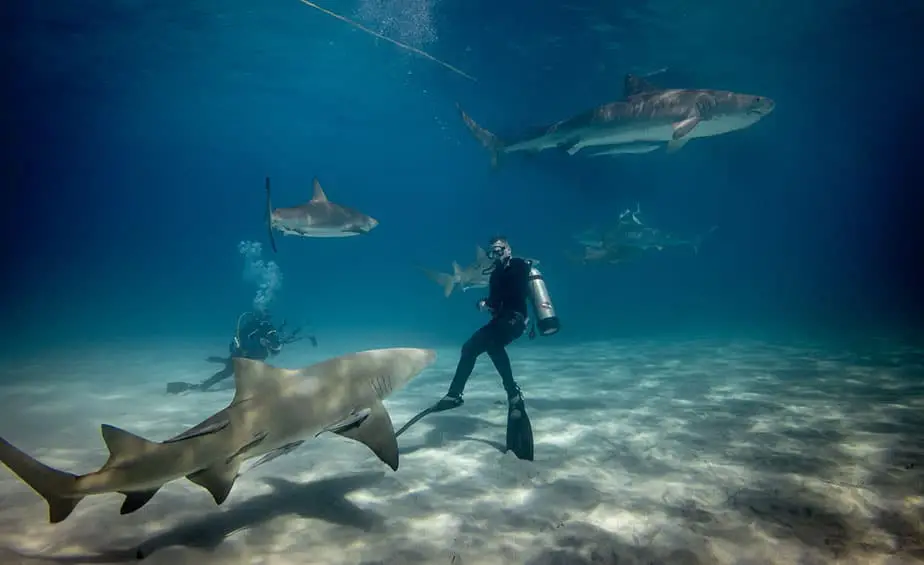
One of the joys of taking up an underwater activity like scuba diving and freediving is the opportunity to observe marine life. Whether it’s large species like whales, dolphins, and sharks, or combing through the coral reefs for seahorses and nudibranchs, there are vast numbers of wonderfully weird and beautiful creatures just waiting to be found.
Unfortunately for us, most marine life are painfully shy and will stay far away. Their cautiousness is not unwarranted, of course, but that’s a story for another time. In particular, scuba divers often frighten the aquatic life away when they exhale and produce bubbles. Schools of small fish will immediately disperse to make way for the bubbles to pass through.
Since freedivers don’t exhale underwater, they can get much closer to marine life due to the lack of bubbles. If a freediver remains calm enough, some fish will even get curious enough to approach because they have never seen such a creature like a human before.
The downside of interacting with marine life for freedivers is that they don’t have very long to do so before they need to surface for air. Scuba divers have the clear advantage here, since they can patiently wait for the appearance of rare marine life. Scuba divers can also dive much deeper and explore dive sites more fully, so they can get a more comprehensive experience than a freediver.
One last point to consider is that freedivers have more freedom to change how deep they want to dive than scuba divers. For instance, if a freediver dives down to 10m then spots something interesting at 20m, they can do so if they have enough oxygen remaining in their lungs.
On the other hand, scuba divers will plan their dives in advance and descend to the deepest depth first before they slowly make their way up. If they suddenly notice something below them on their ascent, they are to observe it from their current depth because descending again poses more risks.
Training differences
In order to scuba dive, you need to pass an Open Water course to receive the proper training and get a certification. This certification grants you the privilege to rent/purchase gear from dive shops and hire the services of a dive operator. If you do not have a certification, these people will refuse to service you.
Freedivers should also take a course, such as the SSI Level 1 or AIDA Level 1 or 2, to get the proper training and get certified. Technically anybody can freedive even without a certification, however we do not recommend it. Without proper training, the risks are too great and you are gambling with your life.
Costs
There are various costs associated with both of these sports. First, there is the cost of taking the courses to get certified, which should be around $200 to $400 for both disciplines. This is just for the basic certification that is suitable for recreational divers. However, if you wish to progress all the way up to the higher levels, perhaps to an instructor level, then it will cost several thousands of dollars taking all of the prerequisite courses.
Once you’re certified to go on recreational dives, you should expect to pay anywhere from $75 to $200 per dive to charter a boat. There is also the cost of filling the cylinder which is around $10-$20. A freediving training session is about the same price as chartering a boat.
The biggest difference in cost between scuba diving and freediving lies in the equipment costs. For scuba divers who purchase their own BCD, wetsuit, regulator, fins, mask, weight belt, dive computer, cylinder, SPG, and so on, the equipment cost is easily in the several thousands dollars.
Most divers rent their equipment, such as the tank, BCD, and weights, however divers may want to have their own dive computer, mask, and wetsuit and this costs several hundreds of dollars.
Freedivers on the other hand just need to have a mask, wetsuit, fins, weight belt, weights, a snorkel, and a surface marker with buoy line all of which can be purchased under $500. Getting a decent freediving watch will add another few hundred dollars to the running total.
Equipment
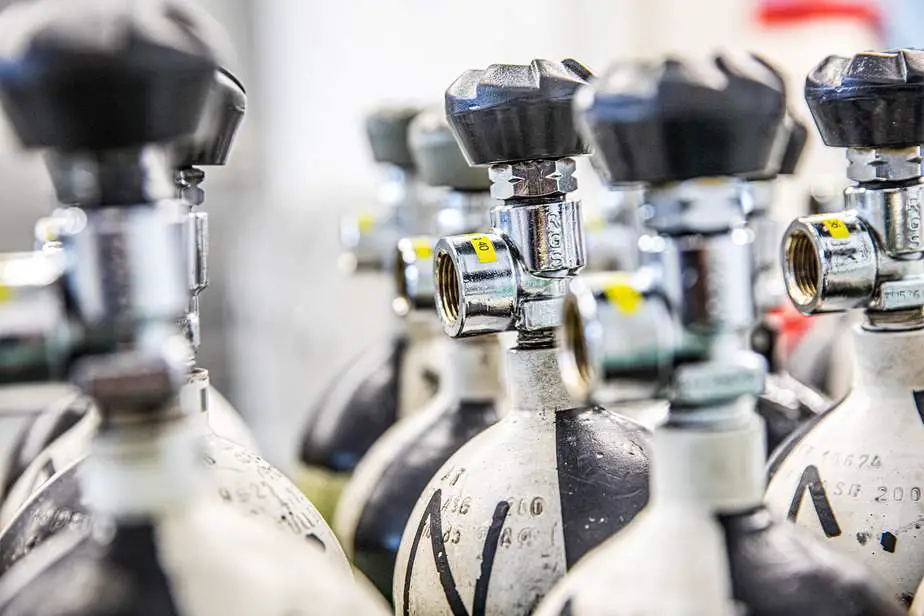
As mentioned in the Costs section, scuba diving requires much more gear than freediving. When you don all of your scuba gear on land, it can weigh as much as 50 pounds. Thankfully, all of that gear will feel weightless underwater, though the bulk is still there. Your movements will be somewhat restricted while scuba diving compared to freediving.
Minimal gear is necessary for freedivers. They cannot afford to bring anything unnecessary because the extra drag it produces makes a big difference. Remember, freedivers only have one breath to work with, so their equipment must be as streamlined and efficient as possible in order for them to set a new depth record. Freedivers do not want their movements restricted at all.
Since freediving does not need as much gear, traveling is much easier than a scuba diver. Scuba divers who bring their own gear abroad should expect to bring an additional checked bag for their equipment. On the other hand, freedivers can probably fit all of their gear in the main bag, with the only exception being the fins which can be brought onboard as hand luggage.
To avoid the hassle of dealing with traveling with scuba gear, many divers just rent their gear from the dive center. In this regard, they can reach parity with freedivers. However, if a scuba diver must rent each time they want to dive, the costs can add up over the years.
Fitness
Both of these diving disciplines require a level of basic fitness so that they can perform them safely. Since scuba divers can rely so much on their gear to assist them, the fitness requirements for them are lower. Freediving is a lot more pure in the sense that they rely on their body to push past their limits, not necessarily their gear.
For instance, a freediver who wants to dive as deep as they can for as long as they can must have a mastery of their heart rate, breath hold, swimming ability, and mentality. Freediving is a sport where not feeling on top of their game can cause a diver to underperform severely. Scuba divers on the other hand have a lot of leeway for error because they have a safety net in the form of their gear.
If a freediver has access to a body of water they can regularly train in, they may be able to perform some impressive freedives. However, if their only chance to train is during a holiday or dive trip, then it’s a lot more difficult to be at the physical peak they need to be to set a new record. In order to maximize their performance, they should abstain from alcohol or fast food.
Exploration experience
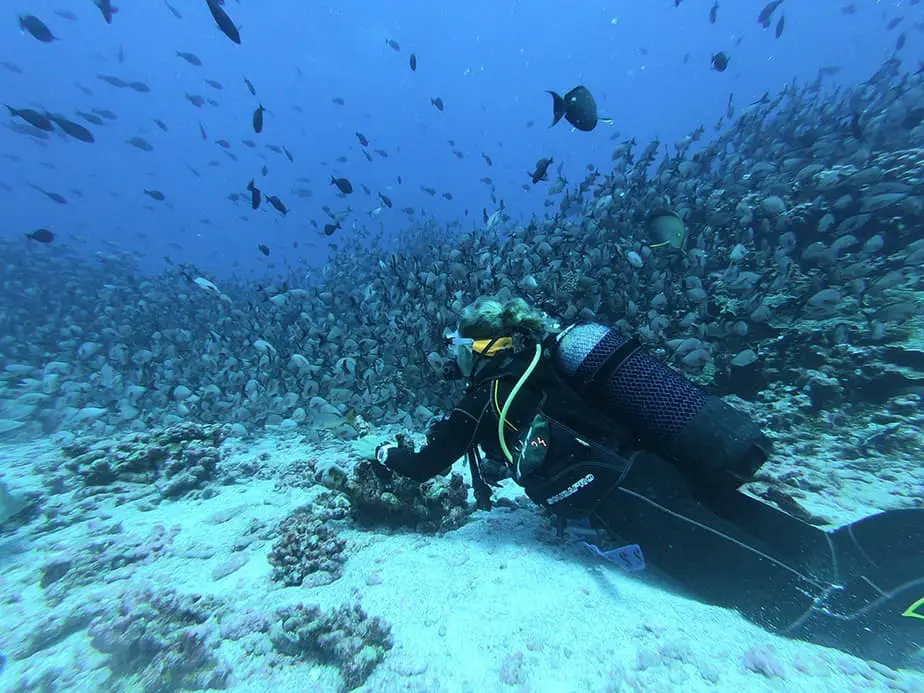
The physical experience of scuba diving and freediving is drastically different. Scuba divers have the advantage when it comes to comfort. They do not need to worry as much about running out of air thanks to the air supply they can continuously breathe from. Depending on how deep they dive, a scuba tank can last for approximately 45 to 60 minutes for a recreational dive.
During this time, they have so much freedom to explore down to their depth limit. They can take their time to follow some interesting fish, corals, wrecks, or anything else that catches their eye. However, they do have to stick close to their dive buddies and should not wander off on their own.
Compare this with freedivers who can only stay underwater for as long as their one breath allows them to. The average person probably couldn’t last longer than 30 or 60 seconds before feeling like they desperately need to breathe. Experienced freedivers can hold their breath for 2 to 3 minutes, perhaps even more.
If a freediver is training to set a new personal record, then they are not diving for pleasure in the same way a scuba diver is. The entire time they are descending, they aren’t looking around for beautiful marine life to look at. Their mind is focused entirely on the dive because all it takes is one mistake and they’ll fail to set a record and may even lose consciousness.
Snorkelers can also skin dive, which is when they dive down to get a closer look at something. It’s kind of like a more recreational version of freediving. This way, they aren’t limited to only passively observing from above and can get a close up of things that look interesting to them.
Risks and dangers
Out of these two activities, freediving is the riskier once to participate in. Of course, scuba diving has its fair share of dangers too. One that is prevalent in both is the risk of drowning. Both require extensive training and should be done with a dive buddy watching them in case an emergency happens.
Freedivers are more at risk of drowning because if they miscalculate their remaining air time, they may find themselves dozens of feet underwater with not enough air to surface. Thankfully, this almost never happens because qualified freedivers are so well-trained, cautious, and are usually diving with a buddy that can rescue them. If done correctly, freediving should be one of the safest diving sports judging by the low number of deaths.
The most deadly thing about scuba diving is not the risk of drowning, but rather the risk of getting decompression sickness. In fact, one of the diver’s pieces of equipment, the dive computer, is literally designed to prevent decompression sickness. By following the time limits, ascent rate limit, and decompression information provided by it, divers can avoid getting bent.
With that said, a mistake divers sometimes make is thinking they are safe from decompression sickness once the dive is over. However, if they were to go up to a high elevation, such as the mountain or in the air, then they can risk experiencing DCS once again. Freedivers do not have to worry as much about surface intervals and can safely board a flight not long after their dive session.
You might be interested in reading our articles on snorkeling vs. scuba diving and snorkeling vs. freediving.

